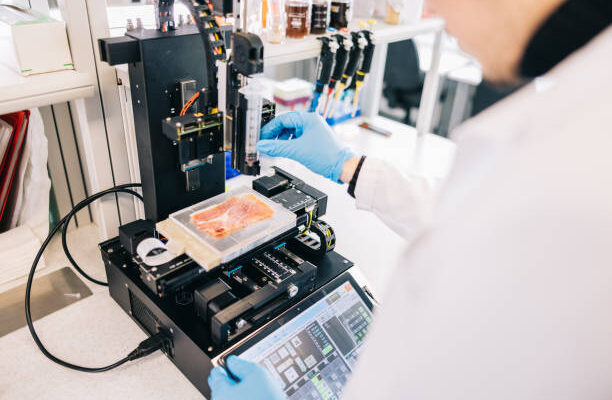The 3D Printed Medical Devices Global Market Report 2024 by The Business Research Company provides market overview across 60+ geographies in the seven regions – Asia-Pacific, Western Europe, Eastern Europe, North America, South America, the Middle East, and Africa, encompassing 27 major global industries. The report presents a comprehensive analysis over a ten-year historic period (2010-2021) and extends its insights into a ten-year forecast period (2023-2033).
Learn More On The 3D Printed Medical Devices Market:
https://www.thebusinessresearchcompany.com/report/3d-printed-medical-devices-global-market-report
According to The Business Research Company’s 3D Printed Medical Devices Global Market Report 2024, The 3d printed medical devices market size has grown exponentially in recent years. It will grow from $3.57 billion in 2023 to $4.44 billion in 2024 at a compound annual growth rate (CAGR) of 24.5%. The growth in the historic period can be attributed to customization and personalization, regulatory approvals and standards, rise in demand for patient-specific solutions, collaborations and partnerships, cost-efficiency and time savings.
The 3d printed medical devices market size is expected to see exponential growth in the next few years. It will grow to $12.01 billion in 2028 at a compound annual growth rate (CAGR) of 28.2%. The growth in the forecast period can be attributed to increased accessibility and affordability, widespread adoption of 3d printing in healthcare, remote healthcare and telemedicine integration, focus on sustainable and eco-friendly practices,biocompatible material innovations, . Major trends in the forecast period include regulatory adaptation to technological advances, integration of artificial intelligence, technological advancements in 3d printing, point-of-care printing, remote printing and telemedicine.
The increasing prevalence of osteoarthritis and similar musculoskeletal conditions is one of the major factors driving the growth of the 3D printed medical devices market. Osteoarthritis is a disorder that damages the joint cartilage and surrounding tissues causing pain, stiffness, and loss of joint function to the person affected by it. The 3D printing medical devices enable the creation of a replica of a patient’s joint, which can provide surgeons with a crucial piece of information that might not be visible on a 2-dimensional scan. The chance of developing osteoarthritis increases with age. For instance, according to the US National Library of Medicine report, by 2040, it is estimated that approximately 78 million (26%) US adults aged 18 years and above will be projected to have doctor-diagnosed arthritis. Thereby driving the adoption of 3D printed medical devices, positively impacting the market growth.
Get A Free Sample Of The Report (Includes Graphs And Tables):
https://www.thebusinessresearchcompany.com/sample.aspx?id=2503&type=smp
The 3d printed medical devices market covered in this report is segmented –
1) By Type: Implants, Surgical instruments, Prosthetics, Tissue engineering devices, Other Types
2) By Raw Material: Plastics, Biomaterial inks, Metals and Alloys
3) By Technology: Fused Deposition Modelling, Digital Light Processing, Stereolithography, Selective Laser melting
4) By Application: Orthopedic, Spinal, Dental, Hearing Aids, Other Applications
5) By End User: Hospitals, Diagnostics Centres, Academic Institutions, Other End Users
The increasing use of 3D printing technology in the spine industry is one of the latest trends in the 3D printing medical devices market. The spine industry is adopting 3D printing to produce new innovative products that can promote bone ingrowth and improve implant fixation to spine bone, reducing the number of manufacturing steps, thereby making the 3D printing process more cost-effective in several cases. For instance, Medtronic launched its titanium 3D printed platform – TiONIC Technology. TiONIC Technology is a 3D printed technique that uses laser methods to create implants with enhanced surface textures. Artic-L is the first implant created by the company using TiONIC Technology. The implant is made up of titanium and is designed to be used by surgeons in spine surgery. In addition to that, K2M’s Lamellar, introduced its 3D Titanium Technology to create a 3D spinal implant. The 3D printing medical device using titanium technology uses an advanced 3D printing method to create structures that were once considered impractical with traditional manufacturing techniques. The implants use titanium powder and are associated with bone growth activity.
The 3d printed medical devices market report table of contents includes:
1. Executive Summary
2. 3D Printed Medical Devices Market Characteristics
3. 3D Printed Medical Devices Market Trends And Strategies
4. 3D Printed Medical Devices Market – Macro Economic Scenario
5. Global 3D Printed Medical Devices Market Size and Growth
.
.
.
26. South America 3D Printed Medical Devices Market
27. Brazil 3D Printed Medical Devices Market
28. Middle East 3D Printed Medical Devices Market
29. Africa 3D Printed Medical Devices Market
30. 3D Printed Medical Devices Market Competitive Landscape And Company Profiles
Top Major Players:
- Siemens AG
- General Electric Company
- Arcam AB
- Hewlett Packard Development Company LP
- Adobe Inc
Contact Us:
The Business Research Company
Europe: +44 207 1930 708
Asia: +91 88972 63534
Americas: +1 315 623 0293
Email: [email protected]
Follow Us On:
LinkedIn: https://in.linkedin.com/company/the-business-research-company
Twitter: https://twitter.com/tbrc_info
Facebook: https://www.facebook.com/TheBusinessResearchCompany
YouTube: https://www.youtube.com/channel/UC24_fI0rV8cR5DxlCpgmyFQ
Blog: https://blog.tbrc.info/
Global Market Model: https://www.thebusinessresearchcompany.com/global-market-model




